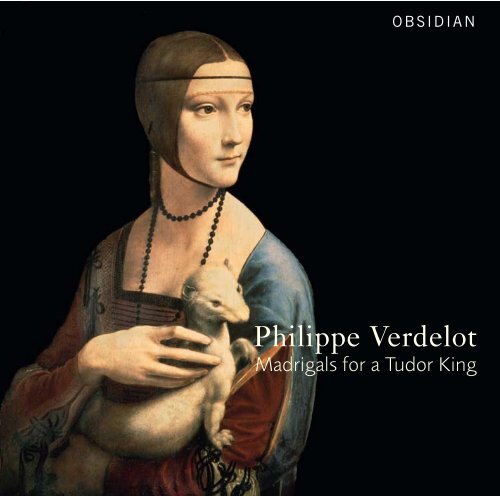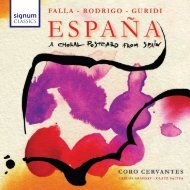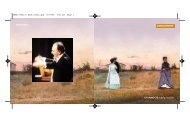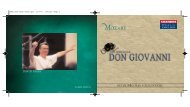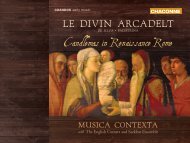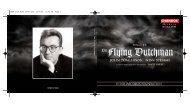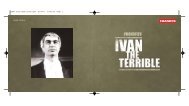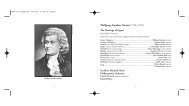Create successful ePaper yourself
Turn your PDF publications into a flip-book with our unique Google optimized e-Paper software.
OBSIDIANPhilippe VerdelotMadrigals for a Tudor King
Philippe VerdelotMadrigals for a Tudor King1. Italia mia bench’ el parlar’ (a,b,c,e,f)2. Con l’angelico riso (a,g)3. Quanto sia lieto il giorno (a,c,d,f)4. Lasso, che se creduto (g)5. O dolce nocte (a,c,d,f)6. Madonna qual certeça (a,g)7. Afflicti spirti mei (a,c,d,f)8. Dentr’ al mio cor’ (g)9. Quando nascesti, Amore? (a,b,c,d,e,f)10. Piove da li occhi (a,g)11. Pur troppo, donna (a,b,c,d,f)12. I vostri acuti dardi (g)13. Chi non fa prove, amore (a,c,d,f)14. Liet’ è madonna et io pur (g)15. Con lacrim’ et sospir’ negando porge(a,c,d,f)16. Donna, se fera stella (a,b,c,d,f)17. Ognun si duol’ d’amore (g)18. Altro non è el mio amor’ (a,b,c,d,f)19. Madonna io v’amo e taccio (a,b,c,e,f)20. Sì suave è l’inghanno (a,c,d,f)21. Se ben’ li occhi (g)22. Cortese alma gentile (a,c,d,f)23. Quanta dolceça amore (c,g)24. Donna che sete fra le donne belle (a,c,d,f)25. La bella donna (a,c,d,f,g)26. Deh, quant’ è dolc’ amor (g)27. Donna leggiadr’ et bella (a,c,d,f)28. Madonna, per voi ardo (a,g)29. Amor, io sento l’alma (g)30. Ultimi mei sospiri (a,b,c,d,e,f)Total time(3’33)(1’35)(1’41)(2’07)(2’00)(2’22)(2’06)(2’08)(2’44)(1’13)(2’12)(2’10)(1’53)(2’00)(1’31)(2’36)(1’49)(2’25)(2’25)(1’49)(1’57)(2’21)(1’38)(2’14)(5’03)(2’27)(1’22)(1’41)(1’54)(3’28)(66’58)ALAMIREClare Wilkinson, MEZZO SOPRANO (a)Steven Harrold, TENOR (b)Christopher Watson, TENOR (c)William Unwin, TENOR (d)Timothy Scott Whiteley, BASS (e)Robert Macdonald, BASS (f)LYNDA SAYCE,LUTE AND RENAISSANCE HARP (g)Directed by David SkinnerCover image: The Lady with the Ermine(Cecilia Gallerani) 1496 Leonardo da Vinci(1452–1519) Czartoryski Museum, Cracow,Poland/The Bridgeman Art LibraryRecorded in St Michael’s Church,Summertown, Oxford 27-28 April& 31 October 2006.Produced and Engineered by Martin SouterPerforming editions by David SkinnerTranslations by Peter HainsworthOBSIDIAN<strong>CD703</strong> & 2007 Classical Communications LtdMade in Great Britain
Philippe VerdelotMadrigals for a Tudor KingDonna che sete fra le donne belleQuasi fra l’ herbe un fiore,Udite quell, che dir mi face amore.Lady, who is among beautiful womenLike a flower among the grasses,Listen to what love makes me say.Lodovico Martelli (1499–1527)Cultural exchange in the early sixteenthcentury included not only literature andpaintings, but the most passionate of all thearts: Music. It has now been 35 years sinceH. Colin Slim’s publication, A Gift ofMadrigals and Motets, which formed a transcriptionwith commentary of choral musicfrom the so-called ‘Newberry Part<strong>book</strong>s’.These part<strong>book</strong>s were originally a collectionof five manuscript volumes, one for each offive vocal parts. Slim provided a masterfulhistorical study of these manuscripts, showingthat they were very probably a gift fromthe city of Florence to King Henry VIII ofEngland in around 1526. England’s greatmusical heritage has many of its roots in thereign of Henry VIII, but it is always surprisingto consider that of the thousands ofmusical manuscripts which must have circulatedduring that culturally rich time only ahandful have come down to us intact. Thehistory of the Newberry Part<strong>book</strong>s is typicalof the chequered history and almost miraculoussurvival of many similar manuscripts.While the part<strong>book</strong>s probably became part ofHenry’s royal library (although there areunfortunately no markings to suggest this),they somehow came, nearly a century afterthey were written, into the hands of FrancisTregian the Younger, a Catholic recusantwho compiled an anthology from the collectionwhile in the Fleet prison where he diedin 1619. The fate of the <strong>book</strong>s thereafter is
unknown until the late nineteenth century, bywhich time the altus <strong>book</strong> had apparentlygone missing. From the hands of WilliamHayman Cummings, an organist and antiquarian,the four remaining <strong>book</strong>s passed onto Bernard Quaritch, who repeatedly offeredthem for sale until the Newberry Library inChicago finally bought them in 1935. Slimaccordingly was working from only four ofthe original five part<strong>book</strong>s, and in order tomake complete musical sense of the musicthey contained he either reconstructed themissing part where necessary, or found it inother sources.The missing altus <strong>book</strong>, however, had apparentlynever left England, and, following Slim’s1972 publication, scholars quickly realised itssignificance and its connection to the otherfour volumes. As an isolated manuscript volumeof a single musical line its practicalvalue was limited, and it could only have beenpreserved for the sake of antiquarian curiosityor of Catholic sentiment. As it happens, itwas owned by Francis Kerril Amherst, theRoman Catholic Bishop of Northampton,who left it to his old school of St Mary’s,Oscott College, in Sutton Coldfield upon hisdeath in 1883. A delighted H. Colin Slimwrote up the find in the pages of Early Music(1978), where he provided transcriptions ofthe missing alto lines 1 . The true contents ofthe <strong>book</strong>s were thus finally reunited(although still physically parted), and now 30years on this is the first complete recording ofthe madrigals in the collection.The Newberry-Oscott part<strong>book</strong>s, whileassembled on foreign soil, may be rankedamong the ‘English’ sources. The <strong>book</strong>s containa balanced offering of 30 motets and 30madrigals. The motets (some of which wererecently recorded by the Oxford-based choir‘Magdala’ on The Gift of Music label, CCLCDG1158) are typical for the first quarter ofthe sixteenth century, being either Mariandevotions, items for the Mass, or texts fromthe psalter. Two, however, are in tribute to thegreat kings of France and England: the collectionbegins with a motet to François I bySermisy (Quousque non reverteris pax), and thelast motet is one in tribute to Henry VIII (Nilmajus superi vident). Owing to the inclusion ofthe Sermisy (the first motet in the collection)it is thought that the <strong>book</strong>s might have originallybeen intended as a gift to the French,but the later inclusion of the motet to HenryVIII confirms that their final destination wasEngland.It is the madrigals, however, that raise thecollection’s status as one of the most importantsecular sources of the early sixteenthcentury. The entire collection seems to have
een compiled under the supervision of theFrench-born Florentine composer PhilippeVerdelot. The composer arrived in Florencein May of 1521, and he is known to have circulatedwith Machiavelli and other republicanintellectuals. During his time in the Cityhe held the most prestigious musical positionsthere: maestro di cappella at the Baptisteryof S. Maria del Fiore (from 24 March 1522 atthe latest to 7 September 1525) and at thecathedral (2 April 1523 to 28 June 1527).Verdelot is famous for having pioneered theItalian madrigal, and was certainly the mostimportant composer of that genre beforeJacob Archadelt. He brought musical life tothe texts of Petrarch, Martello, Machiavelliand others, and very likely composed all 30madrigals in the <strong>book</strong>s (the majority areascribed to Verdelot, and those few that lackan inscription are generally assumed to beby him).Verdelot here sets his music to a variety ofpoetic forms such as the canzona (absorbingjust over half the collection) the ballad, sonnetand their derivatives. The style, dictatedby the poetry, is highly declamatory, and thewords are expressed musically through a subtlemixture of close imitative counterpointand homophonic chordal passages, oftenalternating in the same work. Cadential formulaeare clearly mapped out, and providethe necessary musical punctuation to emphasizethe text. Regardless of these somewhat‘modern’ ideas, many passages are still heavilyinfluenced by the sombre ‘church’ style ofcomposition which very much dominatedthis period: these were very early days for themadrigal, but Verdelot was central in shapingand influencing the form as it developedthroughout the rest of the sixteenth century.The performing forces for this recordinghave been selected to reflect a natural variationof sonority throughout the programme:some works are performed by a consort ofsolo voices, others arranged for lute andvoice, while others still are reserved for sololute; many of Verdelot’s madrigals do indeedsurvive in sixteenth-century sources as versionsfor lute and voice or lute solo (includingsome curious examples where the bassline – rather than the top – is taken by thesoloist, and the rest by the lute). Full textsand translations for all 30 works are hereprovided, and make essential reading whilelistening.1H. Colin Slim, ‘A Royal Treasure at SuttonColdfield’, Early Music (1978), 57–74.David SkinnerSidney Sussex College, Cambridge
TEXTS AND TRANSLATIONSThe texts are happy to remain very much within the conventions of love-poetry of the time.The authors characteristically sew together amalgams of phrases from Petrarch, probably takingthem from easily available compendia or dictionaries or else simply picking them up as normalpoetic usage. In most texts, traces of contemporary Florentine usage or other dialects creepin now and then. Usually the texts make sense, but the syntax can be fairly free. With very fewexceptions (some of the Machiavelli perhaps) the writers were not aiming at individuality andnovelty or even at poetic grandeur, but rather to supply variations on commonplaces that theyand their listeners and readers found endlessly fascinating and enjoyable.Peter HainsworthITALIA MIAItalia mia, bench’ el parlar’ sia indarnoA le piaghe mortaliChe nel’ bel corpo tuo sì spesse veggio,Piacem’ almen’ ch’ e’ mia sospir’ sien quailSper’ il Tever’ et l’ ArnoE ‘l Po dove doglioso et grave hor’ seggio.Rector’ del’ ciel’, io cheggioChe la pietà che ti condusse in terraTi volgha al tuo dilect’ almo paese:Vedi, Signor’ cortese,Di che levi cagion che crudel guerra,Marte superb’ et fero,Apri tu, padr’, e ‘ntenerisci et snoda;Ivi fa ch’ el tuo vero,Qual’ io mi sia per la mia linigua s’ oda.Canzona by PetrarchMy Italy, though words are uselessto heal the mortal woundswhich I see in such numbers in your beautiful body,I am glad that at least my laments are suchas the Tiber and the Arno hope for, and the Po too,where I now sit, sorrowful and weighed down.Ruler of Heaven, I begthat the compassion which brought you down to earthmay turn your eyes to your beloved, divine country.See gracious Lord, how cruel a war has sprung fromsuch slight causes, and see the hearts which proudand fierce Mars hardens and holds fast;open them, Father, soften them and unknot them;there let your truth(no matter who I am) be heard from my tongue.
CON L’ANGELICO RISOCon l’angelico risoA me negasti i dolci baci sancti;Et coi penosi piantiBenignamente mi basciasti el viso.Sol’ il cor lieta da pieta diviso,Havete a vostra voglia, et sola pia,Sete ne l’aspra noia.Da le lacrime gioiaHebb’, et dal riso acerba pena ria.O lassi, o lassi amant’, inseme premaSempr’ a vo’ il cor, ohmè, sperança et tema.Canzona by Lodovico MartelliWith an angelic smileyou denied me your sweet, sacred kisses,and with painful tearsyou graciously kissed my face.You alone, happily have at your command a heart,deprived of compassion, and you alone are kindlyto me in my harsh distress.From my tears I gained joyand from laughter I gained bitter pain.O unhappy, O unhappy lovers, maytogether hope and fear always, alas, weigh upon yourhearts.QUANTO SIA LIETO IL GIORNOQuanto sia lieto il giornoNel qual le cose anticheSono hor da voi dimostre et celebrate,Si vede, perch’ intornoTutte le gente amicheSi sono in questa parte ragunate.Noi, che la nostra etateNe’ bosch’ et nelle selve consumiamo,Venuti anchor’ qui siamo,Io nympha, et noi pastori,Et giam cantando inseme e nostri amori.Canzona by Niccolò MachiavelliHow happy is the dayon which things of past agesare now revealed and extolled by you, can now be seen,because on every sideall friendly peopleare gathered here.We who spend our yearsin the woods and the forests,we, too, have come here:I, a nymph, and we, shepherds,are now singing together about our loves.
LASSO, CHE SE CREDUTOLasso, che se credutoHavesi a qualche amante,Che già tanto senti d’ amor dolersi,Non harei hor’ perdutoLe mia fatiche tante;Et manco mi dorriaCh’ a laudar’ tropp’ amor’ le labia apersi.Ma hor’ che nella priaLibertà son tornato et vivo sciolto,Scoprirò le sua fraud’ in modo taleCh’ in breve li fia toltoL archo, li strali, la pharetra, et l’ ale.CanzonaAlas, if I had believedcertain loverswhom I heard complain so much of love,I would not have wastedall of my labours;and it would pain me lessthat I opened my lips to praise love too much.But now that I have returnedto my former freedom and live unshackled,I shall reveal love’s dissemblingso that soon he will be deprived ofhis bows, his arrows, his quiver and his wings.O DOLCE NOCTEO dolce nocte, o sanct’Hore nocturn’ et quete,Ch’ i desiosi amanti accompagnate;In voi s’ adunan tanteLetitie, onde voi seteSole cagion di far l’ alme beate.Voi, i giusti premii dateA l’ amorose schiere, a voi amiche,Delle lunge fatiche;Voi fat’, o felice hore,Ogni gelato pect’ arder d’ amore.Canzona by Niccolò MachiavelliO sweet night, O blessednocturnal and still hoursthat wait on ardent lovers;in you so manydelights are joinedthat you alone make souls feel blessed.You bestowupon the companies of lovers, friends of yours,due rewards for long trials.You, O happy hours, makeevery frozen breast burn with love.
MADONNA, QUAL CERTEÇAMadonna, qual certeçaHaver’ si può maggior’ del mio gran foco,Che veder’ consumarmi a poco a poco?Ahymè, non conosceteChe per mirarvi fisoSon’ col pensier’ da me tanto diviso,Che transformarmi sent’ in quel’ che sete?Lasso, non v’ accorgeteChe poscia ch’ io fu pres’ al vostro laccio?Arross’ impalledisco ard’ et agiaccio?Dunque, se ciò vedete,Madonna, qual certeçaHaver’ si può maggior’ del mio gran foco,Che veder’ consumarmi a poco a poco?Ballata-madrigal by Dragonetto BonifazioMy lady, what greater certaintyof the great fire burning me can be hadthan to see me gradually being burnt away?Ah me, do you not knowthat because of my fixedly gazing at youI am so estranged from myselfthat I feel myself transformed into what you are?Alas, do you not realisethat since I have fallen into your snareI blush, I blanch, I burn and I freeze?Then, if you see this,my lady, what greater certaintyof the great fire burning me can be hadthan to see me gradually being burnt away?AFFLICTI SPIRTI MEIAfflicti spirti mei,Non sperate gia mai d’haver’ più pace,Poi ch’ a madonna sì il vostro mal piace.Ben’ vi credesti gioir ne’ primi anni,Ch’ amor la cara libertà vi tolseSì far dolci li inganniE i lacci al cor’ s’ advolse,Fin’ che l’ ingrato discovrir li volse.Piangete, dunque, I vostri grevi danni,Da ch’ a chi sola ne porria dar pace,S’ il vostro mal’ afflicti spirti pace.BallataO my tormented spirits,never hope to have peace again,because your suffering so pleases my lady.In the first years you really thought to be joyfulwhen love deprived you of that cherished freedomso as to render deceptions sweet,and trapped your heart in snaresuntil the ingrate decided to uncover them.Weep, then, for your grievous woes,since the only one who might give you peacetakes such pleasure in your tormented spirits.
DENTR’ AL MIO COR’Dentr’ al mio cor, si sierraUna dolceça taleQuando, Madonna, li occhi vostri sguardo;Nè credo mai in terraFussi belleça equale.Et se non ch’ à me stesso pur riguardo,Già ben direi io ardoSì come Apollo suole.Così la vostra luceChe cieco mi conduceLa dov’ amor’ comandar puote et vole,Dov’ ogni cor gentileNon cura di servir signor’ si vile.CanzonaWithin my heart is enclosedsuch a sweetnessmy lady, when I look into your eyes;I do not think ever on earthwas a like beauty.And if I only think of myselfI would say that I burnas Apollo always does.Thus it is your beaconthat leads me, a blind man,where Love can and does command,where each noble heartdoes not mind serving such a miserable master.QUANDO NASCESTI, AMORE?Quando nascesti, Amore? Quando la terraSi riveste di verd’ et bel colore.Al’ hor’ di che nascesti? D’ un ardoreCh’ otio et lascivia in se richiud’ et serra.Che ti constringe a farne tanta guerra?Calda sperança et gelido timore.In cui fai la tua stança? In gentil coreChe sotto el mio valor tosto s’ atterra.Chi fu la tua nutrice? Giovineça.Et le serve che furno a lei dintorno?Vanità, gelosia, pomp’ et belleça.Di che ti pasci? D’un parlar’ adorno.Offendeti la mort’ o’ la vechieça?No, ch’ io rinasco mille volt’ il giorno.Sonnet by Pamfilo SassoWhen were you born, Love? When the earthdecks itself in green and lovely colours.Of what were you born then? Of ardourthat leisure and wantonness enclose and clasp within themselves.What forces you into such conflict?Warm hope and frozen fear.Where is your abode? In a noble heartthat by my prowess is soon vanquished.Who was your nurse? Youth.And the maid-servants who surrounded her?Vanity, jealosy, pride, and beauty.On what are you nourished? On fine talk.Can death or old age affect you?No, for I am reborn a thousand times a day.
PIOVE DA LI OCCHIPiove da li occhi della donna miaUna tanta beltate,Et con epsa fiammell’ in compagniaDi spirito animate,Et d’ ardor infiammate,Che chi li mira un pochoForç’ è che pruovi l’ amoroso foco.CanzonaThere rains from my lady’s eyessuch beautyand with it flickering flames,alive with spiritual powerand aflame with ardour,that whoever gazes at them for a little whilemust experience the amorous fire.PUR TROPPO, DONNAPur troppo, donna, in van tant’ ho speratoDeh non giunger torment’ al mio gran duolo.Non poss’ io dir’ quell che si vede aperto?Si ved’ aperto ch’ io t’ habbi lassato.A che, lasso, il direi?Anç’ io ben’ questo vie più dir dovrei.Che e’ non è forse quell ch’ io dico certo?Non fu, nè sarà mai.Io vorrei almen’ veder’ ne un segno solo.Prest’ il vedrai, ma sotto obscuro velo,Chè senç’ ale non può volarsi al cielo.Madrigal(He) Alas, my lady, vain were my high hopes.(She) Ah, do not add torment to my great suffering.(He) May I not say what is so clear to see?(She) It is clear to see that I have left you.(He) To what end, alas, should I say it?(She) Indeed, I should say it even more.(He) For is not what I say a certainty?(She) It was not, nor will it ever be.(He) I would like to see at least one single sign of it.(She) Soon you’ll see, but darkly,because without wings one cannot fly to heaven.
I VOSTRI ACUTI DARDII vostri acuti dardiMi fan’, ahy, ahymè, madonna, si languire,Ch’ io son giunt’ al morire.Non più veloci son ma ben’ si tardiI pasti ch’ aquetavane el mio core;Ond’ io, lasso, son foreDa’ desiati vostri dolci sguardi.Et pur, convien ch’ io guardiIl duol, eh Dio, ch’ io sento,Chè mai sarò contento.Ballata-madrigalI vostri acuti dardiMi fan’, ahy, ahymè, madonna, si languire,Ch’ io son giunt’ al morire.Non più veloci son ma ben’ si tardiI pasti ch’ aquetavane el mio core;Ond’ io, lasso, son foreDa’ desiati vostri dolci sguardi.Et pur, convien ch’ io guardiIl duol, eh Dio, ch’ io sento,Chè mai sarò contento.CHI NON FA PROVE, AMOREChi non fa prove, amore,Della tua gran possança, indarno speraDi far mai fede veraQual sia del ciel’ il più alto valore;Nè sa come e’ si vive inseme, et more,Come si segue il danno e ’l ben’ si fugge,Come s’ ama se stessoMen’ d’ altrui, come spessoPaur’ et speme i cori agiaccia et strugge;Nè sa come ugualmente homini et deiPaventan l’ arme di che armato sei.Canzona by Niccolò MachiavelliHe who has not experienced, Love,your great power, hopes in vaintruly to experiencewhat is the highest power of heaven;nor does he know how one lives and dies together,how one seeks the bad and flees the good,how one loves oneselfless than another, how oftenfear and hope freeze and melt hearts;nor does he know how men and gods equallydread the weapons with which you are armed.
LIET’ È MADONN’ ET IO PURLiet’ è madonn’ et io pur, come soglio,Vo provand’ ogn’ hor’ nuovo dolore,Perch’ el misero scoglioDel l’ antico suo ardore,Con più forç’ et vigourTutto si incende dentr’, adragm’ adragma.Et io del suo contentoQuel piacer’ prendo et sento,Che si ricercha a desiata fiamma,Si ch’ in breve momentoCangio stat’ et voler sença merçede.Et lei s’ el sa che dentr’ al cor’ mi sede.Canzon-madrigal by Biagio BonaccorsiMy lady is content, and yet I, as usual,continually undergo new sufferings,because the wretched obstacleof her old lovewith greater force and vigouris little by little catching fire within her.And I, from her contentment,take and feel that pleasurewhich one seeks from a longed-for love,so that in an instantmy desires and condition change without reward.And she knows it, being enshrined in my heart.CON LACRIM’ ET SOSPIR’ NEGANDOPORGECon lacrim’ et sospir’ negando porge,Madonn’ i desiati baci al core.Et perchè tropp’ ardoreDentr’ al mio pecto scorge,Si dona benchè mest’ al nostr’ amore,O grato et dolce nodoOv’ io si lieto in servitù mi godo.MadrigalDenying me with tears and sighs,my lady proffers the desired kisses to my heart.And because too much ardourshe discerns within my breast,she gives herself, though sad, to our love;how welcome and sweet is the bondwhere I take such delight in servitude.
DONNA, SE FERA STELLA’Donna, se fera stellaMi fe da voi lontan’ per tormi pace,Stata v’ è sempr’ ancellaL’ alma a cui fuor’ di voi null’ altro piace.Però, lasso, mi spiaceDe l’ altrui colp’ haver’ la pena el danno,Et che novello amanteDel mio mal ghoda. Ahy, vostre luci sancte,Ch’ in vit’ alt’ et gentil’ tenuto m’ hanno,Così morir’ mi fanno.CanzonaLady, if some cruel starplaced me far from you to rob me of peace,you have always had a handmaidenin my soul, which delights in you alone.Still, alas, I am grievedto suffer pain and harm from other’s faults,and grieved that a new loverhave joy from my sufferings. Ah, your blessed eyes,that kept me alive so nobly and so kindly,thus make me die.OGNUN SI DUOL’ D’ AMOREOgnun si duol’ d’ amore: io me ne lodo,Chè poi ch’ io son’ dentr’ ai toi lacci entratoPiù ch’ altro innamorato,Col mio bel sol mi godo;Et s’ alcun pianger odo,Dico felice a me che in sì bel statoVivo più ch’ altro, felice et beato.Canzona-madrigalEveryone complains about love: I praise it,for since I have been trapped by your snares,more than any other lover,I enjoy my beautiful sun.And if I hear someone weeping,I say, “O happy me,” for in such a wonderful conditiondo I live, more than anyone else, fortunate and blessed.
ALTRO NON È EL MIO AMOR’Altro non è el mio amor’ ch’ el proprio inferno,Perchè l’ inferno è sol vedersi privoDi contemplar’ in ciel un’ sol dio vivo.Nè altro duol’ non v’ è nel foco eterno.Adunque, il proprio infern’ è l’ amor’ mio,Ch’ in tutto privo di veder’ sono io,Quel’ dolce ben’ che sol veder’ desio.Ahy, possança d’ amor, quanto sei forte,Che fai ghustar’ l’ infern’ ançi la morte.Madrigal by Luigi CassolaMy love is nothing other than hell itself;for hell is only being unable to seeone living god in heaven.Nor is there greater suffering in the eternal fire.Therefore, hell itself is my own love becauseI am completely bereft of the sight of my sweet love,the only one I long to see.Ah, power of love, how strong you are,Who makes us taste hell before death.MADONNA, IO V’ AMO ET TACCIOMadonna, io v’ amo et taccioVel può giurar’ amoreChe tanto foco è in me quanto è in voi giaccioEt s’ io non oso direL’ intenso mio martire,No so per salvar’ me ma il vostro honore.Io vi porto nel core;Da voi vien’ l’ alta spem’, e ‘l gran desire;Et merçe vostra vivo in fiamm’ acceso.Vorrei sença parlar’ esser’ inteso.Madrigal by Luigi Cassola?My lady, I love you and keep silent;Love may well swear to youthat there is as much fire in me as ice in you.And if I dare not recountthe severity of my suffering,I do not save myself, but your honour.I bear you in my heart,from you comes high hope and great desire;and thanks to you, I live on fire with ardent passion.I would – without speaking – be understood.
SI SUAVE È L’ INGHANNOSi suave è l’ inghannoAl fin condoct’ immaginato et caro,Ch’ altrui spoglia d’ affanno,Et dolce face ogni gustato amaro.O remedio alto et raro,Tu mostr’ il dritto call’ a l’ alme erranti;Tu, col tuo gran valore,Nel far’ beato altrui, fai ricco, amore;Tu vinci, sol coi tuoi consigli sancti,Pietre, veneni e ‘ncanti.Canzona by Niccolò MachiavelliHow sweet is the deceit,which attains its imagined, cherished goal,which removes one’s sufferingand sweetens every bitterness one has tasted.O lofty and rare remedy,you show the straight path to errant souls;you with your great prowessin making a person blissful, make him rich, O Love;you vanquish, solely with your blessed counsel,magical stones, poisons and spells.SE BEN’ LI OCCHISe ben’ li occhi mia infermi al mirar’ voiNon son, Madonna, sì prompti et alteriCome forse li altrui assai presti et leggieri,Pò vedersi girar’ nel vostro aspectoNon perciò dentr’ al pectoSento ch’ e’ manchi amore,Ma per degno rispectoDi non monstrar’ di foreQual si sia dentro l’ affannosa guerra,Volto per mancho mal quelli alla terra.MadrigalThough my languishing eyes, when looking at you,are not, my lady, so quick and proud,as those so fast and fleet of otherscan be seen to turn toward you,it is not because I feel thatlove dwells not with my breast,but out of dignity and respect,not to show outwardlythe crippling strife within,for the lesser ill I cast down my eyes.
CORTESE ALMA GENTILECortese alma gentile,Che in sì pietose membraAccolse lieto con sua mani amore,Se ben’ mio basso stile,Et con duol mi rimembraNon sorgersi che farti possa honore,Come vorrebb’ il core,Ch’ ad hor’ ad hor’ mi sforçaA dir’ tua leggiadr’ opre,Et quant’ humiltà quopreIn sè tua vagh’ et pargoletta scorça.Pur dirò con quell çelo,Ch’ amor’ mi spirerà dal terço cielo.CanzonaGracious, noble soul,who so sympatheticallystretched welcoming hands to love,though my inferior style(and I recall it with sorrow)cannot rise high enough to honour youas my heart would wish,which constantly forces meto tell of your charming waysand of what humility dwells withinyour adorable youthful exterior,still will I speak with that zealwhich love will inspire in me from the third heaven.QUANTA DOLCEÇA AMOREQuanta dolceça amore,Arrechi seco il tuo dolce veneno;Se non è gentil coreNol può sentir’ non che ritrarl’ a pieno,Ch’ un sol sguardo serenoSeco ha tanto di bene,Ch’ e’ ristora mille onte et mille pene.CanzonaHow much sweetness, Love,your sweet venom brings with itself,none but the noble heartmay feel, though not fully express,because a single serene glancecontains such goodness,that it heals a thousand affronts and a thousandpains.
DONNA CHE SETE FRA LE DONNEBELLEDonna che sete fra le donne belleQuasi fra l’ herbe un fiore,Udite quel, che dir mi face amore.Se voi fuste da Dio facta sì bella,Che per voi il mondo piace,Non siate tanto di merçe rubella;Chè togliendomi paceMi diate quel, che più che morte spiace.Non ha pena chi muoreMa chi consum’ in pianto e giorn’ et l’ hore.Ballata by Lodovico MartelliLady, who is among beautiful womenlike a flower among the grasses,listen to what love makes me say.If God makes you so beautifulthat because of you the world is pleasing,don’t be so ungenerous with your favours,because in taking away my peaceyou give me what is more unpleasant than death.He who dies feels no pain,but not so one who consumes days and hours in tears.
LA BELLA DONNALa bella donna a cui donaste il core,La qual fu sì cortese,Che per sì caro don’ vi die se stessa,Hor, che novellament’ al ciel è gita,Sciolta di quella spoglia,Che fu refugio et sol delli occhi vostri,Si volge a dietr’ et sent’ il duro pianto,Che si fa in terr’, onde sospira et dice:È questo il lacrimar del mio Signore?Queste parole acceseSon pur la voce, che nel cuor m’ è impressa?Egli si lagna de la mia partita,La qual par, che disciogliaTutto quell ben, che havea dali occhi nostri.Certo m’ incresce del suo pianger, tanto,Che talhor non mi lascia esser felice.Dunque Signor, se per lo vostro ardoreIl suo morir v’ offeseTanto, che ‘l pianger vostro unqua non cessa,Pensate come ella è nel ciel gradita;E se desir v’ invogliaDi sua belleza, oprate i cari inchiostri,E celebrate lei con dolce canto,Che fu sola fra noi vera Fenice.Canzona with stanza continua by GiovanniGiorgio TrissinoThe beautiful lady to whom you gave your heart,who was so kind that in returnfor such a precious gift she gave you herself,now that she has lately returned to heaven,divested of that bodywhich was the refuge and sun of your eyes,she looks back and hears the pitiful lamentwhich comes from earth, wherefore she sighs and says:Are these the tears of my Lord?Are these words of fireindeed the voice impressed upon my heart?He bewails my departure,which seems to undoall the good he received from my eyes.I am so affected by his weepingthat at times it does not let me enjoy bliss.Therefore, my Lord, if your passionate lovewas so hurt by her deaththat your weeping never ceases,think how welcome she is in heavenand, if you feel desirefor her beauty, load your pen with inkand celebrate in sweet song onewho alone was a true Phoenix among us here.
DEH, QUANT’ È DOLC’ AMORDeh, quant’ è dolc’ amor ch’a tanti è noia,Che m’ ha nel mio bel stato anchor concessoMirando l’ idol mio veder’ me stesso,Ivi parmi seder pien’ d’ogni gioia,Con amor’, col mio sol’, et con mia vita,Et ragionar’ insemeDi lei, di sua beltate, et di mia speme.O dolceça infinita,Poi ch’ ella doppiamente mi conforta,Chè me nelli occhi et mia salute porta.Ballata-madrigal by Claudio Tolomei orFrancesco Maria MolzaAh, how sweet is love which is to many painful;in my fine state, it has still granted me,gazing on my idol, to see myself;I seem, filled with all delights, to be seatedwith my love, my sun, and my life,and to discourse togetherabout her, her beauty, and my hope.O, infinite sweetness,for she comforts me twice over,because she bears me and my well-being in her eyes.DONNA LEGGIADR’ ET BELLADonna leggiadr’ et bella,Che con le vostre luci m’accendesteIl dì che la mia stellaMi conduss’ a veder’ l’ altere honesteVostre belleçe: poi chè la mia sorteM’ ha facto vostro, non mi date morte.Canzona-madrigal by Giovanni BrevioDelicate and beautiful lady,who with your eyes set me afire,the day my starled me to see your proud chastebeauty; since my fatehas made me yours, do not condemn me to death.
MADONNA, PER VOI ARDOMadonna, per voi ardo,Et voi non lo credete,Perchè non pia quanto bella sete.Ogn’ hora io miro et guardo.Se tanta crudeltà cangiar’ volete,Donna, non v’ accorgeteChe per voi moro et ardo?Et per mirar vostra beltà infinitaEt voi sola servir bramo la vita.MadrigalMy lady, I burn with love for youand you do not believe it,for you are not as kind as you are beautiful.I look at you and admire you constantly.If you wish to change this great cruelty,Lady, are you unawarethat for you I die and burn?And in order to admire your infinite beautyand to serve you alone, I desire life.AMOR, IO SENTO L’ ALMAAmor, io sento l’ almaTornar’ nel foco ov’ ioFu liet’ et più che mai d’ arder desio.S’ tu mi raccend’ il core,Et io ne son contentaEt ritorn’ humilment’ al giogh’ antico,Opra ch’ el mio signoreParte del foco sentaOv’ io dolc’ ardo e i mei pensier’ nutrico;Fa che ponga in oblioMia fugh’ e dilli el mio novo desio.Ballata by Niccolò MachiavelliLove, I feel my soulreturn to the fire where Iwas joyful and more than ever want to burn.If you rekindle my heart,and I am happy about it,and I return humbly to the former yoke,let it be that my lordfeels part of the flamein which I sweetly burn and feed my thoughts.And have him forgetmy flight and tell him of my renewed desire.
ULTIMI MEI SOSPIRIUltimi mei sospiri,Che mi lassate fredd’ et sença vita,Contate i mei martiriA chi morir’ mi ved’ et non m’ aita.Dite, o beltà infinita,Dal tuo fedel’ ne caccia empio martire.Et se questo gli è grato,Gitene ratt’ in ciel’ a miglior’ stato.Ma se pietà le porg’ il vostro dire,Tornat’ in me, ch’ io non vorrò morire.Canzona by Lodovico MartelliMy dying sighs,which leave me cold and lifeless,recount my sufferingsto one who sees me perishing and does not help me.Speak, O infinite beauty,release your faithful lover from his horrid torments.And if these please her,go swiftly to heaven and a better state.But if your words arouse her pity,return to me, for I shall not want to die.ALAMIREFounded by David Skinner in 2005, Alamireis made up of some of the finest consortsingers in the UK and exists in order toexplore and promote the compositionalprocesses behind the great masterworks, andlesser-known works, of the late medievaland early modern periods. Other recordingson the Obsidian label include the MissaD’ung aultre amer, motets and chansons byJosquin Desprez with Andrew Lawrence-King, and a recording of the church andchamber music of Thomas Tomkins withthe Choir of Sidney Sussex College,Cambridge, and the viol consort Fretwork.Other projects include sound installationsfor art galleries and soundtracks fortelevision and film.www.alamire.co.uk
Picture credit: Stuart BunceDavid Skinner is known primarily for hiscombined role as a researcher and performerof early music, and is Fellow and Director ofMusic at Sidney Sussex College, Cambridge,and an Affiliated Lecturer in the Faculty ofMusic. He teaches historical and practicaltopics from the medieval and renaissanceperiods. From 1997 to 2001 he was aPostdoctoral Fellow of the British Academy atChrist Church, Oxford (where he was aChoral Scholar from 1989 to 1994), and wasthe Lecturer in Music at Magdalen College,Oxford, from 2001 to 2006. At Cambridge heconducts the Choir of Sidney Sussex College,with whom he has toured and made professionalrecordings. He has published widely onmusic and musicians of early Tudor England,and his most recent projects include the collectedworks of Nicholas Ludford (EarlyEnglish Church Music, 2003 & 2005) and TheArundel Choir<strong>book</strong> (Duke of Norfolk:Roxburghe Club, 2003). He is currently editingthe Latin church music of John Sheppardfor publication in 2008, and co-authoring a<strong>book</strong> on music and the English Reformation.Lynda Sayce isone of the UK’sleading lutenists,and is noted bothas a performerand as a musicalscholar with astrong interest inhistory, literatureand the visualarts. She studiedat St Hugh’sCollege, Oxford,where she matriculatedin Historyand graduated inMusic. She thenstudied lute with Jakob Lindberg at the RoyalCollege of Music, and also took continuoclasses with Nigel North. She holds a Ph.D forher research on the history of the theorbo,and has contributed articles to Early Music,the Revised New Grove Dictionary of Music,and the art journal Apollo, and has editedmany music publications. She performs regularlywith leading period instrument ensembles,including The King's Consort, theAcademy of Ancient Music, the Orchestra ofthe Age of Enlightenment, and the Musiciansof the Globe.


